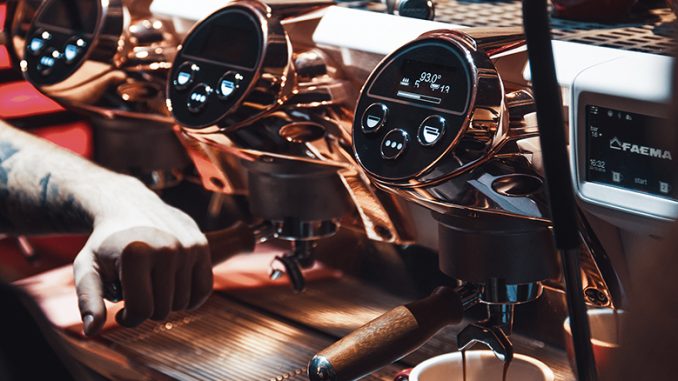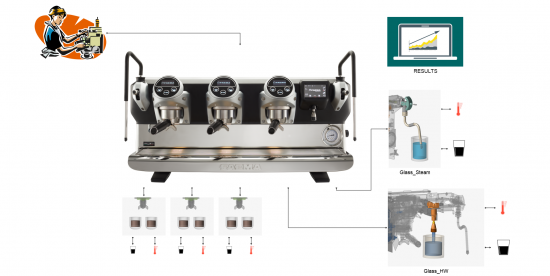
The espresso manufacturers in the group use smart technology to equip their products with advanced internal systems.
BY KATRINA YENTCH
BARISTA MAGAZINE ONLINE
Photos provided by Gruppo Cimbali
While many of us have only half-seriously asked ourselves what the future of coffee with AI (artificial intelligence) might look like, we may have to think more intentionally about that possibility. Don’t panic just yet—human baristas are not about to be replaced by robots anytime soon—but they may be assisted in getting an easier, quicker cup of coffee thanks to advanced technology, and Gruppo Cimbali wants to explore that possibility.
Cimbali is the group behind some of the best-known coffee companies; Faema, La Cimbali, Casadio, and Hemerson are all about to benefit from the collaboration that Cimbali has recently signed onto with tech innovators Altair in developing smart technology for their products.
For context, Gruppo Cimbali has been a longtime advocate of innovation in coffee equipment, having been one of the first companies in the industry to incorporate advanced systems for their Wi-Fi-connected gear. Their first traditional and fully automatic espresso machines are built with “IoT” (Internet of Things) functionality, where drink info and quality can be plugged right into a database for advanced beverage making. “Our commitment to always deliver the best products, combined with our theme of ‘Coffee Starts Here,’ has made innovation a key element in our philosophy,” confirms Cimbali chief products and technologies officer Maurizio Tursini.

The main category that Altair will be focusing on for this study is machine learning through digital twins. A digital twin is supposed to be a super-accurate simulation of a complex machine (aka a virtual espresso machine) that engineers can use to forecast problems without actually going inside the machine. “Thanks to the virtual machine, the engineers can simulate a higher number of configurations or looping until the optimal solution will be found,” explains Maurizio. So would this cancel out a technician? Not a chance. Technicians spend a lot of time diagnosing a problem, which requires digging into the machine. This could be fixed if a digital twin could help diagnose a situation to make a technician’s time more efficient. Similarly, a barista can utilize the digital twin to make sure their espresso machine is in the right working order before the start of a morning shift.
“AI has to be seen as a support to the baristas,” affirms Maurizio. “For instance, if there is a potential failure the AI will advise the barista in order to set up a service intervention and (avoid) service breaks. … In addition to that, the AI could allow the barista to access a number of drink recipes, stored in the cloud, and share them all around the world, for the perfect customized coffee.”
Overall, the goals of digital twins between Gruppo Cimbali and Altair are to increase energy efficiency, decrease the amount of time from product idea to fruition, and reduce the constant need for physical tests. As a barista, will you be ready to use smart technology for your café service?

